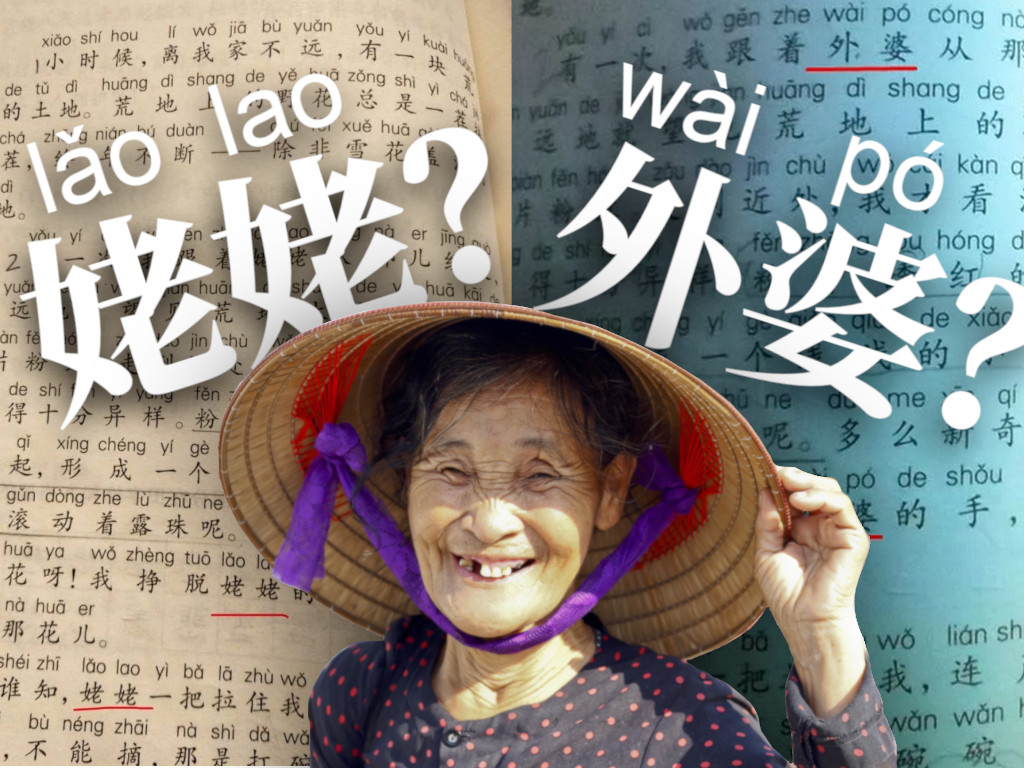An online debate took place last week between Chinese netizens on what the proper Chinese term for your mother's mother is: waipo (外婆) or laolao (姥姥)?
The controversy started when a Shanghai citizen vented on the Internet about a textbook publisher changing waipo to laolao in a Chinese prose. Waipo is the term generally used in southern China, while laolao is used in the north and northeastern regions of China.
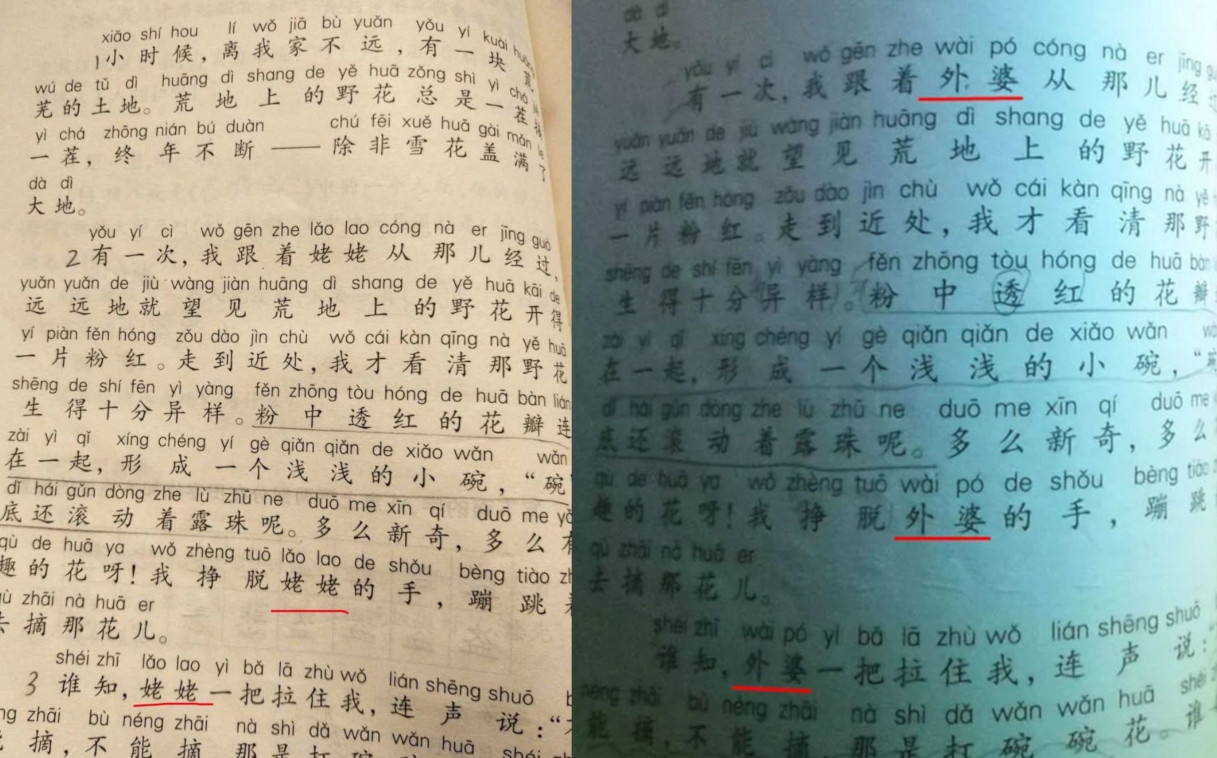 Latest edition of the textbook (left) and the edition without the modified prose (right). Photos via UPN
Latest edition of the textbook (left) and the edition without the modified prose (right). Photos via UPN
The prose's author is from Shaanxi Province, where waipo is normally used. The Shanghaiese also predominately use waipo.
The publisher did not notify the author before publishing the modified version of her prose.
Laolao vs waipo
The editorial decision became a much heated online debate on vocabulary as an alleged response by the Shanghai Municipal Education Commission claimed that laolao is a word from the standard Chinese vocabulary, while waipo is used only in Chinese dialects.
The Education Commission has clarified that the response above was a reply to an enquiry about another textbook from the same publisher.
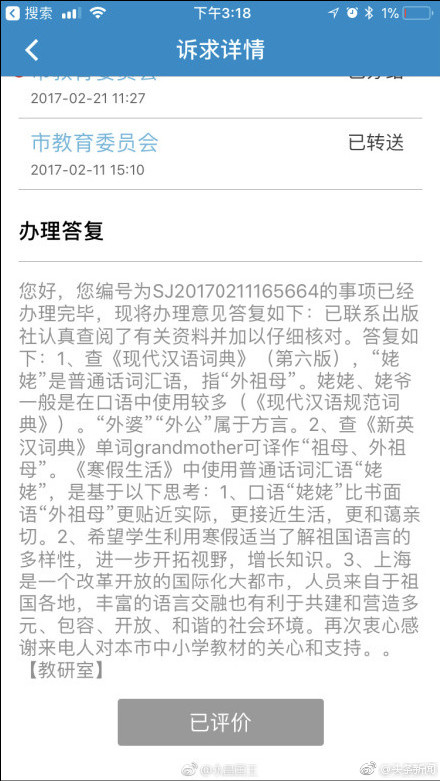 The alleged official response claiming that waipo is a dialectal term. Screenshot via Tiexue.net
The alleged official response claiming that waipo is a dialectal term. Screenshot via Tiexue.net
The Chinese language textbook in question, for primary two students in their second term, is officially endorsed by the Shanghai government. The publisher, Shanghai Educational Publishing House, is also part of a publishing group in which the Chinese state has majority share.
"Changing waipo to laolao is to implement the teaching needs of character recognition at this educational stage," the publisher said in a statement. "Recognising the three characters of wai, po and lao is a basic mission of primary two character recognition... Students would already know how to read wai and po [in the first term], before learning how to recognise the character lao."
To increase students' "understanding of cultural diversity" was another reason for making the change, says the publisher.
The statement was released after the Education Commission demanded a full investigation into the matter.
The author of the prose, Li Tianfang, told The Beijing News that she was not contacted by the publisher on the modified prose. The publisher did not even contact her when they decided to include her prose in the textbook.
"Publishers, especially education publishers, should be the model for respecting authors and copyright laws. The response from Shanghai Educational Publishing House did not recognise the basis of the problem. It is difficult for the rights of authors to be genuinely protected," Li said.
Publisher apologises
The publisher apologised days after the waipo/laolao debate started.
The apology read: "We have realised that... when modifying the prose, we only considered the educational element of character recognition. We did not seek the author's opinion or fully understood regional usages of language. It was truly inappropriate, and for that, we express our sincerest apologies to society and the author."
It emerged that the Education Commission had asked the publisher to apologise and to restore waipo as the prose was originally written.
"All textbook writing efforts in the city must learn a lesson from this, fully respect the author's original writing and intention, and conscientiously protect authors' rights under law," the Education Commission wrote in a statement on Weibo.
The Education Commission has decided that primary two students from Shanghai will not be using the textbook in the coming academic year.
What's the big deal?
The Chinese government has the policy to standardise language through Putonghua, or more formally Modern Standard Chinese. Putonghua was devised as an official language of China based on the Beijing accent and the northern dialect.
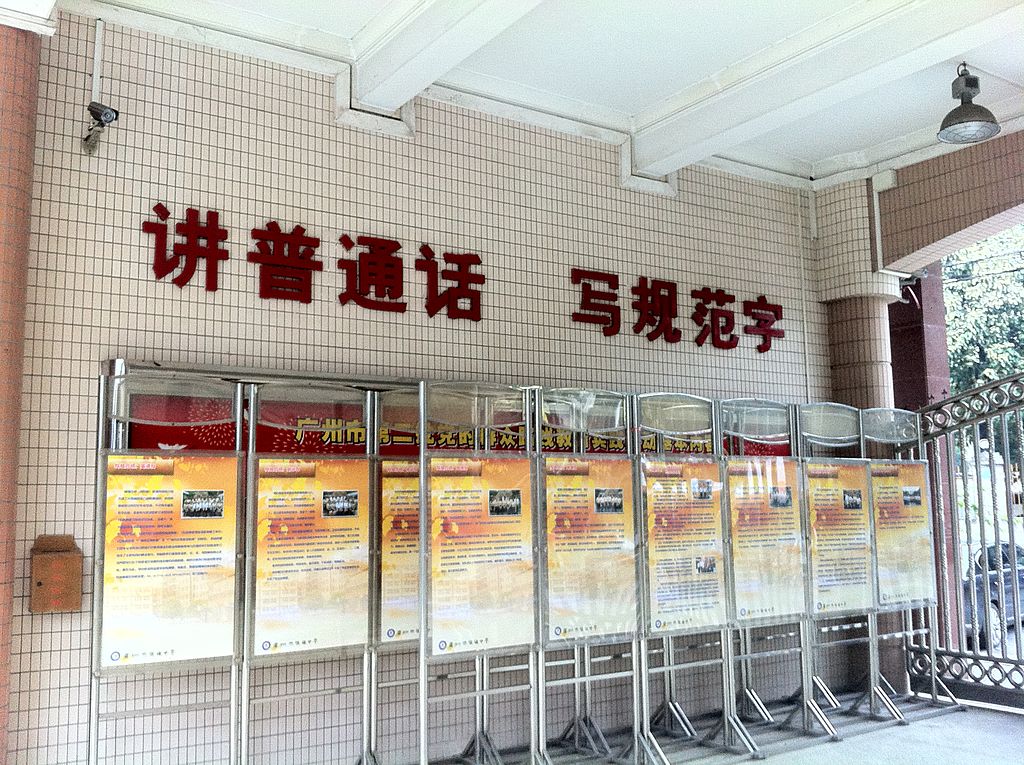 "Speak Putonghua, write normalised characters" written on the walls of a Guangzhou secondary school. Photo by David Wong
"Speak Putonghua, write normalised characters" written on the walls of a Guangzhou secondary school. Photo by David Wong
There's even a law, the Standard Spoken and Written Chinese Language Law, to promote Standard Chinese. The law says that minority ethnic groups have the freedom to use their own language, but there's already much variation in vocabulary within the largest ethnic group — the Han people. Besides waipo and laolao, your mother's mother can also be called a'ma (阿嬷), popo (婆婆), xidie (细爹), jiajia (家家), among others in various parts of China.
Some areas of China have a "culture war" between Putonghua and the regional tongue. In 2010, protesters in Guangzhou, Guangdong gathered in the streets to protest the Guangzhou Broadcasting Network for switching the main broadcasting language from Cantonese to Putonghua.
Even though waipo vs laolao debate was resolved with an apology from the publisher, the apology focused on the fact that the publisher changed the prose without first seeking the author' consent.
Angry netizens continued to comment on the Education Commission's Weibo post a week after the debate started.
While some satirically insert laolao in place of waipo into the title of a famous Chinese folk song...
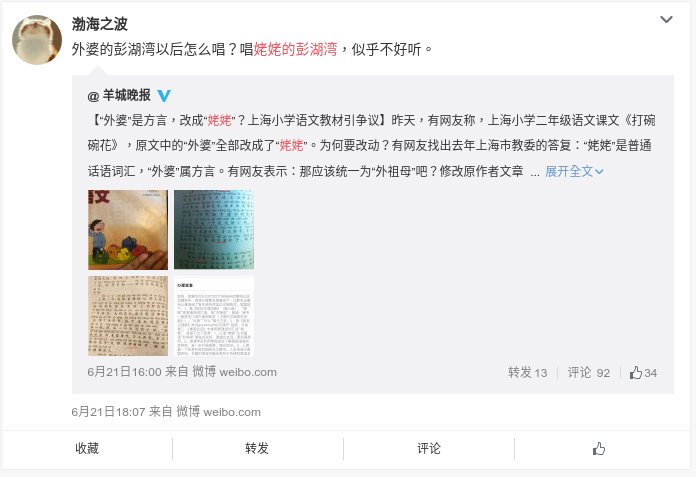 “How should we sing 'Waipo's Penghu Bay' from now on? 'Laolao's Penghu Bay' doesn't sound as nice." Screenshot via Weibo
“How should we sing 'Waipo's Penghu Bay' from now on? 'Laolao's Penghu Bay' doesn't sound as nice." Screenshot via Weibo
... others are less amused and wanted the editor to resign:
 Screenshot via Weibo
Screenshot via Weibo
Although the Shanghai Educational Publishing House said they would "further strengthen the management and guidance of textbook preparation", it is unclear what has been done substantially to prevent future editorial decision such as this.
[related_story]
If you like what you read, follow us on Facebook, Instagram, Twitter and Telegram to get the latest updates.
